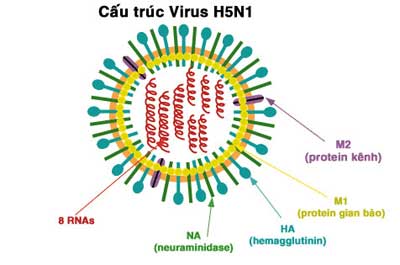The World Health Organization warns that the current vaccines being developed to protect humans against avian influenza may not be effective once a pandemic occurs. The reason is that they do not target the right strain.
“We strongly encourage some countries to develop vaccines for human avian influenza,” said Dr. Henk Bekedam, WHO representative in China, “but we are well aware that this vaccine may not be effective in a pandemic situation.”
 Although the H5N1 avian influenza virus currently has the ability to transmit from birds to humans, it has not yet developed the capability to spread from person to person. Therefore, “it cannot become a pandemic agent in humans. Even if H5N1 becomes a precursor to a pandemic strain, it must undergo a series of decisive changes,” Bekedam noted, indicating that a vaccine effective against it may not necessarily address future variants.
Although the H5N1 avian influenza virus currently has the ability to transmit from birds to humans, it has not yet developed the capability to spread from person to person. Therefore, “it cannot become a pandemic agent in humans. Even if H5N1 becomes a precursor to a pandemic strain, it must undergo a series of decisive changes,” Bekedam noted, indicating that a vaccine effective against it may not necessarily address future variants.
Many companies worldwide are working to develop vaccines against H5N1, but they are primarily targeting the strain that affects poultry, not the potentially dangerous mutated virus of the future.
Last week, China announced it has developed a vaccine for humans and will begin clinical trials in the coming days. This vaccine has demonstrated safety and efficacy in mice, according to a report from Xinhua News Agency, citing an official responsible for overseeing the research. Experts believe that the H5N1 vaccine will be particularly beneficial in protecting those who have close contact with sick poultry, such as farmers, culling workers, and veterinarians.
The Vietnamese Ministry of Health shares the WHO’s perspective on the efficacy of the H5N1 vaccine for humans. Deputy Minister Trinh Quan Huan emphasized that if a flu pandemic occurs with rapid transmission from person to person, the virus responsible will likely not be H5N1 but an entirely new strain. Thus, even if the H5N1 vaccine is successfully produced, it will not prevent a pandemic. Humanity cannot prepare a vaccine capable of combating future virus strains. Historically, influenza viruses mutate frequently and quickly, making it impossible for vaccine production to stay ahead of them; it can only follow suit.
However, according to Huan, research and production of the H5N1 vaccine, as Vietnam is currently doing, remains essential, as this virus still poses a danger to humans. Once successfully produced, it will be used for those at high risk of contracting avian influenza, such as individuals who come into contact with sick birds, live in outbreak areas, or work in culling operations. “Producing H5N1 vaccines for poultry is also extremely important because we cannot eliminate the H5N1 outbreak in just a few years. Asia, including Vietnam, is home to a large number of poultry, and the virus can survive in the environment for a considerable time. Therefore, alongside the research and production of vaccines for humans, Vietnamese scientists are also embarking on H5N1 vaccine research for poultry,” Huan said.
My Linh – Thanh Nhan


















































